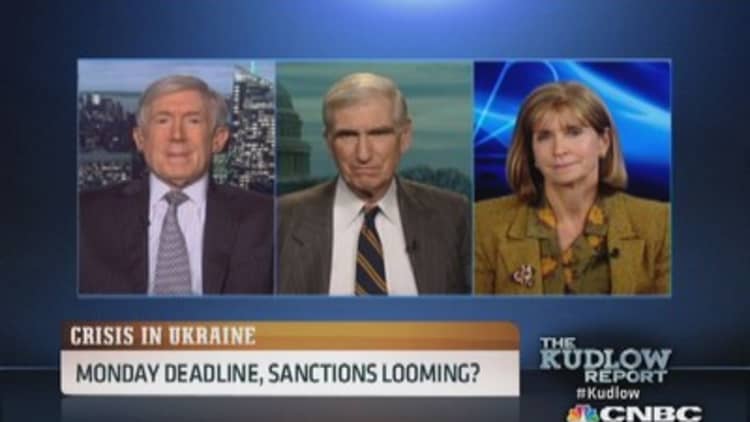The apparent resounding victory for the pro-Russian contingent in Crimea's referendum on Sunday is not going to top any world's biggest surprises list.
What is most important for the region's future is whether the results — with three-quarters of Sunday's votes counted, 95.7 percent had supported annexation by Russia, chief electoral official Mikhail Malyshev told local media, according to Reuters — leads to further escalation of hostilities between the Western powers and Russia.
Both the European Union and U.S were quick to criticize the vote as against international and Ukrainian law. The specter of economic sanctions loomed as the White House called for "concrete steps to impose costs" on Russia following the referendum.
On Monday, Crimea's government will ask Russia to annex the region, which is part of Ukraine but a key military base for Russia.
"We will await the response from Russia—if they annex markets sell off," Timothy Ash, head of emerging markets research at Standard Bank, told CNBC.
(Read more: Crimeans vote on union with Russia as troops pour in)
Russian stocks and bonds are likely to see a further sell-off this week if the crisis escalates.
Russia's parliament, the Duma, will vote on whether to annex the region on Friday, and it is not a foregone conclusion that they will.There are other options less likely to provoke international opinion, such as keeping Crimea autonomous but maintaining a permanent military presence there.
(Read more: Think US nat gas can threaten Russia? Think again)
European Union foreign ministers will meet Monday to discuss what to do next: whether to impose sanctions like asset freezes or visa bans for Russians and Ukrainians involved in the Crimea: Many of whom are close to Russian President Vladimir Putin.
Germany is likely to be one of the most decisive forces here. It has one of the biggest dependencies on Russian natural gas in Europe, yet Chancellor Angela Merkel, who grew up in Communist East Germany, has been surprisingly strong in her criticism of Russian actions.
(Read more: Ukraine Foreign Minister: We will fight for our land)

Even as Crimean people went to the polls, the fulcrum around which this geopolitical crisis is pivoting seemed to be moving.
The risk of full-scale military conflict escalated in eastern Ukraine, with both Russia and Ukraine mobilizing troops close to the border with Russia over the weekend.
"Major eastern Ukrainian cities with large ethnic Russian populations, such as Donetsk, Kharkiv and Luhansk, threaten to become the political battleground in a crisis which, together with mounting concerns about China's economy, pose the biggest challenge to global market sentiment since the dark days of the eurozone crisis," Nicholas Spiro, managing director at Spiro Sovereign Strategy, warned.
—By CNBC's Catherine Boyle. Follow her on Twitter @cboylecnbc.


